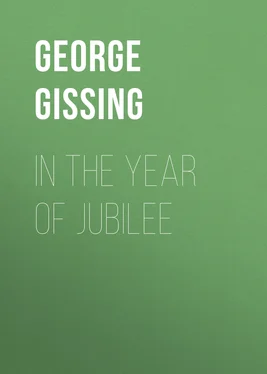George Gissing - In the Year of Jubilee
Здесь есть возможность читать онлайн «George Gissing - In the Year of Jubilee» — ознакомительный отрывок электронной книги совершенно бесплатно, а после прочтения отрывка купить полную версию. В некоторых случаях можно слушать аудио, скачать через торрент в формате fb2 и присутствует краткое содержание. Жанр: foreign_prose, literature_19, foreign_antique, на английском языке. Описание произведения, (предисловие) а так же отзывы посетителей доступны на портале библиотеки ЛибКат.
- Название:In the Year of Jubilee
- Автор:
- Жанр:
- Год:неизвестен
- ISBN:нет данных
- Рейтинг книги:4 / 5. Голосов: 1
-
Избранное:Добавить в избранное
- Отзывы:
-
Ваша оценка:
- 80
- 1
- 2
- 3
- 4
- 5
In the Year of Jubilee: краткое содержание, описание и аннотация
Предлагаем к чтению аннотацию, описание, краткое содержание или предисловие (зависит от того, что написал сам автор книги «In the Year of Jubilee»). Если вы не нашли необходимую информацию о книге — напишите в комментариях, мы постараемся отыскать её.
In the Year of Jubilee — читать онлайн ознакомительный отрывок
Ниже представлен текст книги, разбитый по страницам. Система сохранения места последней прочитанной страницы, позволяет с удобством читать онлайн бесплатно книгу «In the Year of Jubilee», без необходимости каждый раз заново искать на чём Вы остановились. Поставьте закладку, и сможете в любой момент перейти на страницу, на которой закончили чтение.
Интервал:
Закладка:
Whilst living thus at the seaside, Jessica was delighted by the arrival of Nancy Lord, who came to Teignmouth for a summer holiday. With her came Mary Woodruff. The faithful servant had been ill; Mr Lord sent her down into Devon to make a complete recovery, and to act as Nancy’s humble chaperon. Nancy’s stay was for three weeks. The friends saw a great deal of each other, and Miss. Lord had the honour of being presented to Mrs. Tarrant, the old lady with whom Jessica lived, Mr. Vawdrey’s mother-in-law. At the age of three score and ten, Mrs. Tarrant still led an active life, and talked with great volubility, chiefly of herself; Nancy learnt from her that she had been married at seventeen, and had had two children, a son and a daughter, both deceased; of relatives there remained to her only Mr Vawdrey and his family, and a grandson, Lionel Tarrant.
One evening, as Jessica returned from a ramble with the children, they encountered a young man who was greeted, without much fervour, as ‘cousin Lionel.’ Mr. Tarrant professed himself merely a passing visitant; he had come to inquire after the health of his grandmother, and in a day or two must keep an appointment with friends elsewhere. Notwithstanding this announcement, he remained at Teignmouth for a fortnight, exhibiting a pious assiduity in his attendance upon the old lady. Naturally, he made acquaintance with Miss. Lord, whom his cousins regarded as a great acquisition, so vivacious was she, so ready to take part in any kind of lively amusement. Mr. Tarrant had been at Oxford; his speech was marked with the University accent; he talked little, and seemed to prefer his own society. In conversation with Nancy, though scrupulously courteous and perfectly good-natured, he never forgot that she was the friend of his cousins’ governess, that their intercourse must be viewed as an irregular sort of thing, and that it behoved him to support his dignity whilst condescending to a social inferior. So, at all events, it struck Miss. Lord, very sensitive in such matters. Fond of fitting people with nicknames, she called this young man sometimes ‘His Royal Highness,’ sometimes ‘His Majesty.’
Of Mr. Tarrant’s station in life nothing was discovered. His grandmother, though seemingly in possession of ample means, betrayed an indifferent education, and in her flow of gossip never referred to ancestral dignities, never made mention of the calling her husband had pursued. Mr. Vawdrey was known to be ‘in business,’—a business which must be tolerably lucrative.
On their return to London, the children passed from Miss. Morgan’s care into that of Mrs. Baker, who kept house for the widower at Champion Hill; but Jessica did not wholly lose sight of them, and, at their request, she persuaded Nancy Lord to make an occasional call with her. Mrs. Baker (relict, it was understood, of a military officer who had fallen in Eastern warfare) behaved to the young ladies with much friendliness. They did not meet Mr. Vawdrey.
Early in the following year, old Mrs. Tarrant, forsaking Teignmouth, came to live under her son-in-law’s roof; the winter had tried her health, and henceforth she seldom left home.
To-day, as on former occasions (only two or three in all), Nancy was reluctant to approach the big house; its imposing front made her feel that she came only on sufferance; probably even Mrs. Baker did not regard her as having a right to call here on terms of equality. Yet the place touched her curiosity and her imagination; she liked to study the luxurious appointments within, and to walk about the neglected but pleasant garden, quiet and secluded as if whole counties divided it from Camberwell. In the hall she and Jessica were at once welcomed by the children, who first informed them that tea would be served out of doors, and next made known that ‘cousin Lionel’ was here, in Mrs. Tarrant’s drawing-room. The second piece of news vexed Nancy; she resolved never to come again, unless on formal invitation.
Mrs. Baker, an agreeable woman, received them as if she were the mistress of the house. With Jessica she chatted about matters examinational, which she seemed thoroughly to understand; with Miss Lord she talked of wider subjects, in a tone not unpleasing to Nancy, seeing that it presumed, on her part, some knowledge of the polite world. It was observable that Mr. Vawdrey’s daughters had benefited by the superintendence of this lady; they no longer gossiped loudly about murders and scandals, but demeaned themselves more as became their years.
On the arrival of other ladies to call upon Mrs. Baker, the children drew their friends away into the garden, where tea now awaited them. Amid the trees and flowers time passed not unpleasantly, until, on happening to turn her head, Nancy perceived at a distance the approaching figure of Mr. Lionel Tarrant. He sauntered over the grass with easy, indolent step; his straw hat and light lounge costume (excellent tailoring) suited the season and the place. Jessica, who regarded the young man with something of awe, stood up to shake hands, but Miss. Lord kept her place in the garden chair.
‘Did you see the procession?’ Tarrant inquired. ‘Ah, then I can give you very important news—thrilling news. I know the colour of the Queen’s bonnet, and of her parasol.’
‘Please don’t keep us in suspense,’ said Nancy.
‘They were of pale primrose. Touching, don’t you think?’
He had seated himself crosswise on a camp-stool, and seemed to be admiring the contour of his brown boots. Lionel’s age was not more than seven-and-twenty; he enjoyed sound health, and his face signified contentment with the scheme of things as it concerned himself; but a chronic languor possessed him. It might be sheer laziness, possibly a result of that mental habit, discernible In his look, whereby he had come to regard his own judgment as the criterion of all matters in heaven and earth. Yet the conceit which relaxed his muscles was in the main amiable; it never repelled as does the conceit of a fop or a weakling or a vulgar person; he could laugh heartily, even with his own affectations for a source of amusement. Of personal vanity he had little, though women esteemed him good-looking; his steady, indolent gaze made denial of such preoccupation. Nor could he be regarded as emasculate; his movements merely disguised the natural vigour of a manly frame, and his conversational trifling hinted an intellectual reserve, a latent power of mind, obvious enough in the lines of his countenance.
Nancy was excusable for supposing that he viewed her slightingly. He spoke as one who did not expect to be quite understood by such a hearer, addressing her, without the familiarity, much as he addressed his young cousins. To her, his careful observance of formalities seemed the reverse of flattering; she felt sure that with young women in his own circle he would allow himself much more freedom. Whether the disparagement applied to her intellect or to her social status might be a question; Nancy could not decide which of the two she would prefer. Today an especial uneasiness troubled her from the first moment of his appearance; she felt a stronger prompting than hitherto to assert herself, and, if possible, to surprise Mr. Tarrant. But, as if he understood her thought, his manner became only more bland, his calm aloofness more pronounced.
The children, who were never at ease in their cousin’s presence, succeeded in drawing Jessica apart, and chattered to her about the educational methods imposed by Mrs. Baker, airing many grievances. They nourished a hope that Miss. Morgan might again become their governess; lessons down at Teignmouth had been nothing like so oppressive as here at Champion Hill.
Tarrant, meanwhile, having drunk a cup of tea, and touched his moustache with a silk handkerchief, transferred himself from the camp-stool to the basket chair vacated by Jessica. He was now further from Nancy, but facing her.
Читать дальшеИнтервал:
Закладка:
Похожие книги на «In the Year of Jubilee»
Представляем Вашему вниманию похожие книги на «In the Year of Jubilee» списком для выбора. Мы отобрали схожую по названию и смыслу литературу в надежде предоставить читателям больше вариантов отыскать новые, интересные, ещё непрочитанные произведения.
Обсуждение, отзывы о книге «In the Year of Jubilee» и просто собственные мнения читателей. Оставьте ваши комментарии, напишите, что Вы думаете о произведении, его смысле или главных героях. Укажите что конкретно понравилось, а что нет, и почему Вы так считаете.












